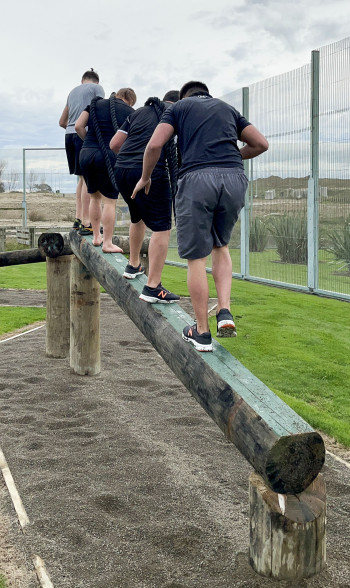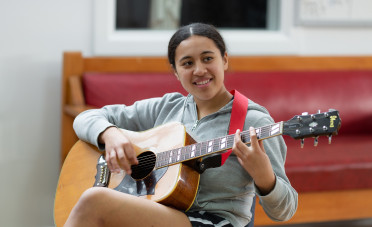Mana Motuhake – determining your own path
Published: June 17, 2025
Rain lashed down as 8 young people gathered to pull a fire truck - the final physical challenge of the youth justice residence pilot programme, Mana Motuhake.

The rain was lashing down when a group of 8 rangatahi gathered around a fire truck at our youth justice residence, Te Au rere a te Tonga. Using their combined strength, they pulled the 12-tonne truck for approximately 300 metres while a group of kaimahi and support people cheered them on.
The fire truck pull was one of several activities completed on the ‘longest day’ - a challenging final event to mark the end of a promising pilot programme for residents in the facility, Mana Motuhake.
Mana motuhake is a te ao Māori concept meaning self-determination. For young people in the youth justice system it’s about gaining the skills to choose a better path. Placement in a youth justice residence can be an opportunity for young people to reset, consider their past offending behaviours and what they want to do in the future, through the support and programming provided by Oranga Tamariki staff.
During the pilot programme they learned resilience through a consistent regimen of early mornings and physical exercise. And, through positive engagement with a range of people, they were taught about the support services available outside the walls of Te Au rere a te Tonga.
Daniel* has been at the residence for four months and was among the group of 8 to experience this pilot programme.
“It wasn’t easy at the start; it was quite a struggle. Now I’m getting up early on the daily routine, I've gotten real used to it," he said.
The concept
The Mana Motuhake pilot is the culmination of months of planning, and years of dreaming. It’s inspired by CACTUS (Combined Adolescent Challenge Training Unit and Support) which uses physical training, activities and self-discipline to support young people to reach their potential. Oranga Tamariki Programme Co-Ordinator Daina Ellison first had the idea to bring a similar course to the youth justice residence years ago, after watching her daughter gain confidence through CACTUS.
She has worked closely with Manawatu police for the past year to create Mana Motuhake, which incorporates a tikanga approach.
Without it (tikanga), I don’t think it would have worked as well. It’s something they’re familiar with and it’s something that gets them excited and gives them the edge.
Daina Ellison, Programme Co-Ordinator
That edge was on full display when the boys did a haka at the pilot graduation. Daina pointed to one of the boys who was too whakamā to even try the haka at the start of the programme. He now stood in the front row pouring his heart into the performance in front of a roomful of guests.
“It’s just a sense of identity that they get from that,” Daina said.
The reality

Incorporating a tikanga approach, Mana Motuhake used physical training, activities and self-discipline to support young people to reach their potential.
Standing alongside the boys as they performed the haka was Oranga Tamariki Youth Worker, Rawiri (Rah) Dean. In fact, he stood alongside the boys every step of the way, even for their 6.30 am starts.
"We get them up early and train. Nobody really wants to do that but after it they feel great and we know the benefits of physical activity, especially for young men like this who have so much energy.”
Rah hopes that commitment is something they can take with them when they leave Te Au Rere and return to an environment which is not always as consistent.
“If this boy is out in the community and he’s strong enough to get up and go to work and provide for his family, that’s our hope,” he said.
Getting the rangatahi into work is something Oranga Tamariki Employment Co-Ordinator Kahn Fotuali’i is focused on. He organises vocational training, including scaffolding and forlift driving, at the youth justice residence. During Mana Motuhake several guest speakers visited the boys, including one business owner who really caught their attention.
“He openly said to the young people he’d give them an opportunity, and they just need an opportunity, a chance,” said Kahn.
“They took it on board and were really interested.”
The future
Manawatu Police Youth Engagement Manager, Leanna Bloemendaal, says it's all about giving the taiohi their moemoeā (dream).
Give them an opportunity, plant the seed to help them see that there is another path. They don’t have to follow just what they know, there is so much support out there if they want it.
Leanna Bloemendaal, Manawatu Police Youth Engagement Manager
That support was wrapped around them when they graduated from the Mana Motuhake programme in front of kaimahi from Oranga Tamariki, NZ Police, Youth Nu’u Trust and the many other groups involved. Daina says that community effort is what makes the programme different to anything else she has seen at the youth justice residence.
“There is so much manpower that goes into it.”
Daina is already looking to the future and hoping Mana Motuhake, or something similar, can run again.
Daniel* shares that hope, so the “next generation” can get the benefits he has.
“I do definitely feel different. Maybe I’ll be able to sharpen up my mind to make better choices on the outside or something,” he says.
Which is exactly what mana motuhake is all about.
* Daniel’s name has been changed to protect his privacy.


